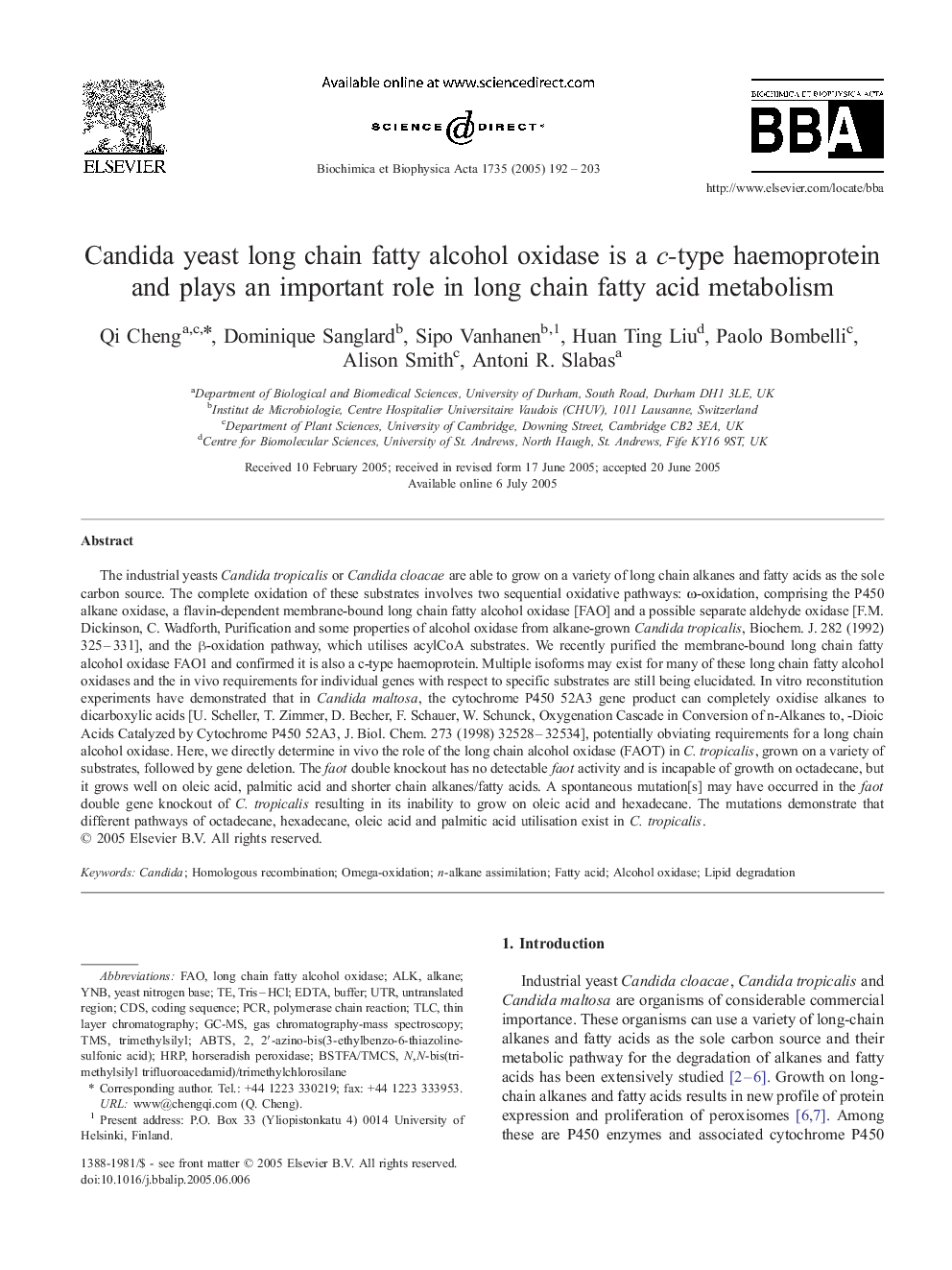| کد مقاله | کد نشریه | سال انتشار | مقاله انگلیسی | نسخه تمام متن |
|---|---|---|---|---|
| 9886530 | 1537832 | 2005 | 12 صفحه PDF | دانلود رایگان |
عنوان انگلیسی مقاله ISI
Candida yeast long chain fatty alcohol oxidase is a c-type haemoprotein and plays an important role in long chain fatty acid metabolism
دانلود مقاله + سفارش ترجمه
دانلود مقاله ISI انگلیسی
رایگان برای ایرانیان
کلمات کلیدی
UTRYNBTMSABTStrimethylsilylTLCHRPGC-MS - کروماتوگرافی گازی-طیف سنج جرمیALK - آلکAlkane - آلکانEDTA - اتیلن دی آمین تترا استیک اسید Fatty acid - اسید چربalcohol oxidase - اکسیداز الکلBuffer - بافرLipid degradation - تخریب لیپیدTris–HCl - تریس-HClcoding sequence - توالی کدگذاریgas chromatography-mass spectroscopy - طیف سنجی جرم کروماتوگرافی گازFAO - فائوuntranslated region - منطقه غیر ترجمهHomologous recombination - نوترکیبی همولوگpolymerase chain reaction - واکنش زنجیره ای پلیمرازPCR - واکنش زنجیرهٔ پلیمرازyeast nitrogen base - پایه نیتروژن مخمرHorseradish peroxidase - پراکسیداز هوررادیشCdS - کادمیم سولفید، سولفید کادمیمCandida - کاندیداthin layer chromatography - کروماتوگرافی لایه نازک
موضوعات مرتبط
علوم زیستی و بیوفناوری
بیوشیمی، ژنتیک و زیست شناسی مولکولی
زیست شیمی
پیش نمایش صفحه اول مقاله

چکیده انگلیسی
The industrial yeasts Candida tropicalis or Candida cloacae are able to grow on a variety of long chain alkanes and fatty acids as the sole carbon source. The complete oxidation of these substrates involves two sequential oxidative pathways: Ï-oxidation, comprising the P450 alkane oxidase, a flavin-dependent membrane-bound long chain fatty alcohol oxidase [FAO] and a possible separate aldehyde oxidase [F.M. Dickinson, C. Wadforth, Purification and some properties of alcohol oxidase from alkane-grown Candida tropicalis, Biochem. J. 282 (1992) 325-331], and the β-oxidation pathway, which utilises acylCoA substrates. We recently purified the membrane-bound long chain fatty alcohol oxidase FAO1 and confirmed it is also a c-type haemoprotein. Multiple isoforms may exist for many of these long chain fatty alcohol oxidases and the in vivo requirements for individual genes with respect to specific substrates are still being elucidated. In vitro reconstitution experiments have demonstrated that in Candida maltosa, the cytochrome P450 52A3 gene product can completely oxidise alkanes to dicarboxylic acids [U. Scheller, T. Zimmer, D. Becher, F. Schauer, W. Schunck, Oxygenation Cascade in Conversion of n-Alkanes to, -Dioic Acids Catalyzed by Cytochrome P450 52A3, J. Biol. Chem. 273 (1998) 32528-32534], potentially obviating requirements for a long chain alcohol oxidase. Here, we directly determine in vivo the role of the long chain alcohol oxidase (FAOT) in C. tropicalis, grown on a variety of substrates, followed by gene deletion. The faot double knockout has no detectable faot activity and is incapable of growth on octadecane, but it grows well on oleic acid, palmitic acid and shorter chain alkanes/fatty acids. A spontaneous mutation[s] may have occurred in the faot double gene knockout of C. tropicalis resulting in its inability to grow on oleic acid and hexadecane. The mutations demonstrate that different pathways of octadecane, hexadecane, oleic acid and palmitic acid utilisation exist in C. tropicalis.
ناشر
Database: Elsevier - ScienceDirect (ساینس دایرکت)
Journal: Biochimica et Biophysica Acta (BBA) - Molecular and Cell Biology of Lipids - Volume 1735, Issue 3, 15 August 2005, Pages 192-203
Journal: Biochimica et Biophysica Acta (BBA) - Molecular and Cell Biology of Lipids - Volume 1735, Issue 3, 15 August 2005, Pages 192-203
نویسندگان
Qi Cheng, Dominique Sanglard, Sipo Vanhanen, Huan Ting Liu, Paolo Bombelli, Alison Smith, Antoni R. Slabas,